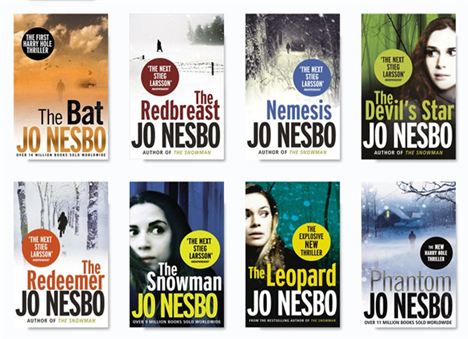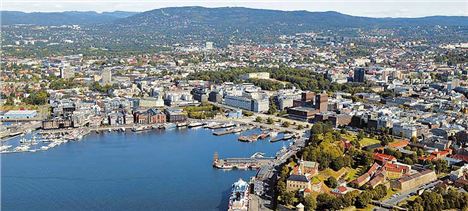“I STAY loyal to my readers by not staying loyal to my readers,” says Jo Nesbø somewhat confusingly, at the recent taster event for October's The Literary Festival at Manchester Town Hall.
Asked why his novels are so successful – he alone has sold more than 20 million books – he says, “The clear focus is on telling a good story."
He’s telling us he’s quite deliberate about the smoke and mirrors in his plot lines and he believes this is what his readers expect and want.
Thus I thought Harry Hole, Nesbø’s anti-hero cop, was dead at the end of the last book, with a bullet to the head, so he got me there. When I asked the writer, before his talk, if he had perhaps allowed himself the option of killing Hole off, he says, “Most definitely not. There were some clues. You should read it again,” he replied. That was me told.
During the event Nesbø gives a revealing account of his relationship with his challenging and difficult hero Harry Hole. At one point he tells us that he has to take a break from “Harry’s world” because of the intensity but that “after about six months he will always creep back”.
Hole (pronounced in two very Norwegian syllables that sound like a darkly mixed up version of Spanish word ‘ole’) has joined the great tradition of literary detectives with a lot on their plate, more in their past, and invariably, no respect for bureaucracy. He’s a bit like Ian Rankin’s Rebus but with more love life and a far greater penchant for violence and mayhem.
Nesbø is touring to promote the latest in the Harry Hole series titled Police – there have been ten books so far. “Will it be the last?” he's asked.
He says, "Police could provide an appropriate ending but Harry's storyline, which I set down some years ago, extends further".
Nesbø is a good speaker, holding his audience with not only his literary past but his personal one too.
He tells us his childhood ambition was to be a professional footballer – indeed to play for Tottenham Hotspur – but his burgeoning career in the Norwegian premier league was brought to an early end in his teens through injury.
He looks like a rock star so it’s no surprise to learn he plays in a band. It was on a trip to Australia that his manager suggested he write. He was expected to produce a sex, drugs and rock 'n' roll documentary, but instead wrote the first Harry Hole story, The Bat, a murder mystery set in Australia.
Nesbø says he continues in, and pays tribute to, a the tradition of Scandinavian crime writing which can be traced back to the novels of the Swedish couple Sjöwall and Wahlöo, who created the detective Martin Beck back in the 1960s.
“It is down to them,” he says, “and to their successors such as Henning Mankell that crime writing is considered more than respectable in the Nordic countries.”
Asked why his novels are so successful – he has sold more than 20 million books – he says, “The clear focus is on telling a good story although the context is invariably political.” A big question for all the Nordic countries with their high standards of living is, 'How can these social democratic societies still go so wrong?' In other words what lies at the heart of politics or in the human spirit that self-destructs?
Nesbø appears to adore exploring the dark heart of mankind.
Eight of the ten Hole books
He provides some insights to his inspiration and methods.
A fellow pupil would bring tweezers to school to torture flies – Nesbø was provoked to wonder at the motivation for this apparently wanton act of planned malice. This desire to understand how people can seemingly blithely engage in evil acts endures.
He is challenged about the extreme scenes of violence portrayed in his books – particularly the most recent ones. He admits to sometimes being “seduced by my own description of sadism.” In retrospect, he says, he thinks he should have toned some scenes down.
Each book, he tells us, begins life as a 5-10 page synopsis which is then expanded to fifty or so pages and then once again up to one hundred. In writing the finished novel, he says, “My job is not to do too much damage to the perfect story.”
How accurate are his depictions of police corruption? “Not at all,” is his blunt reply. He repeats how the story is the thing. “I’ve thoroughly researched the details of police procedure,” he says. “I know when I am lying.” Nesbø is interested in the novel first so the reality of how bureaucracies work always takes a backseat in comparison.
The Nesbø event is a sell-out in Manchester Town Hall.
It sold-out as quickly as a Take That concert and proves the writer’s pulling power and that of his hero Hole. In the stately room there is an appropriate sense of occasion and reverence. Towards the end of the event we are treated to one or two spoilers from the latest book and given lessons in pronouncing the main character’s name - I still can’t get it right.
I might not be able to say Oslo's most unconventional detective but on the tram home, as the suburbs pass by, I lose myself in my signed copy of the disturbing world of Harry Hole and Jo Nesbø.
Manchester Literature Festival, sponsored by HSBC Premier, takes place from 7 to 20 October 2013 at venues across the city. Tickets on sale now - to find out more and to book visit the website or call 0843 208 0500. For a full listing check out the festival website.
 Oslo - where much of the Harry Hole action takes place
Oslo - where much of the Harry Hole action takes place













